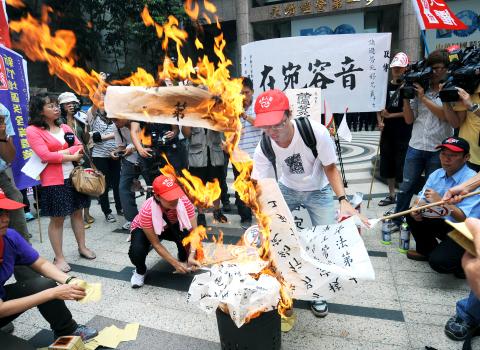More than 100 workers and people from labor-related groups held a rally in front of the Council of Labor Affairs (CLA) on the eve of Father’s Day yesterday morning to protest against what they say are inordinately long working hours.
Holding handmade signs with messages such as “I work such long hours that I can’t see my children when they’re awake” and “I’m so tired from work that I don’t have the energy to raise children,” protesters shouted: “Abolish article 84-1” and “Against working inordinately long hours.”
The protesters said an increasing number of deaths from overwork were occurring in Taiwan because of the amended Article 84-1 of the Labor Standards Law (勞工基準法).

Photo: Lo Pei-der, Taipei Times
Article 84-1 states that the working conditions for certain jobs can be established through labor and capital negotiations, which excludes them from other articles that regulate maximum working hours, overtime hours and minimum holidays.
Most of the workers gathered yesterday were from the security sector and the electronics, electrical and information technology industries in Hsinchu.
The Hsinchu area’s Security Service Industry Trade Union chairperson Lo Chen-kun (羅振昆) said several employers did not hire enough security personnel, so much so that two security workers had to work 12-hour shifts instead of three workers doing eight-hour shifts.
Lo said that although the government had suggested that the maximum monthly working hours for the security sector be set at between 240 and 288 hours, such employees continued to work an average of more than 312 hours a month without overtime pay and with very few rest days.
A worker in his 40s surnamed Lo (羅), who has worked in private security for about a decade, said he worked an average of 12 to 15 hours per day, which meant he could only see his children once a week.
On one occasion, he worked 372 hours in one month, he said.
“Tomorrow is Father’s Day, but I won’t be happy at all,” he said. “Do you think I have any quality of life?”
Trade Union of the Electrical, Electronic and Information Technology Industries chairperson Liang Jui-fang (梁瑞芳) said the employers clearly stated in the labor contract that they applied what is known as the job responsibility system, under which no overtime pay is provided even if employees work inordinately long hours.
Many engineers died on their way to work or at home because of long working hours and excess stress, Liang said.
The protesters prayed for workers who have died from overwork and burned “ghost money” in front of the council’s headquarters. They then presented a pig liver, symbolizing a worker’s ailing liver from overwork, to CLA Department of Labor Standards section chief Huang Wei-shen (黃維深), along with their petition to demand better-protected working conditions.
The protesters shouted their demands as they paraded through the streets of Taipei.
In response, the council said in a press release that it would enforce stricter inspections on labor conditions.
The council also launched a special project, in collaboration with local governments, to conduct a nationwide large-scale inspection of about 10,000 cases, it said.
“Working conditions where employers are unwilling to pay overtime and where workers work inordinately long working hours will be prioritized by the Council when carrying out inspections, and violations can lead to fines of up to NT$30,000,” Huang said.

A small number of Taiwanese this year lost their citizenship rights after traveling in China and obtaining a one-time Chinese passport to cross the border into Russia, a source said today. The people signed up through Chinese travel agencies for tours of neighboring Russia with companies claiming they could obtain Russian visas and fast-track border clearance, the source said on condition of anonymity. The travelers were actually issued one-time-use Chinese passports, they said. Taiwanese are prohibited from holding a Chinese passport or household registration. If found to have a Chinese ID, they may lose their resident status under Article 9-1

Taiwanese were praised for their composure after a video filmed by Taiwanese tourists capturing the moment a magnitude 7.5 earthquake struck Japan’s Aomori Prefecture went viral on social media. The video shows a hotel room shaking violently amid Monday’s quake, with objects falling to the ground. Two Taiwanese began filming with their mobile phones, while two others held the sides of a TV to prevent it from falling. When the shaking stopped, the pair calmly took down the TV and laid it flat on a tatami mat, the video shows. The video also captured the group talking about the safety of their companions bathing

PROBLEMATIC APP: Citing more than 1,000 fraud cases, the government is taking the app down for a year, but opposition voices are calling it censorship Chinese Nationalist Party (KMT) Chairwoman Cheng Li-wun (鄭麗文) yesterday decried a government plan to suspend access to Chinese social media platform Xiaohongshu (小紅書) for one year as censorship, while the Presidential Office backed the plan. The Ministry of the Interior on Thursday cited security risks and accusations that the Instagram-like app, known as Rednote in English, had figured in more than 1,700 fraud cases since last year. The company, which has about 3 million users in Taiwan, has not yet responded to requests for comment. “Many people online are already asking ‘How to climb over the firewall to access Xiaohongshu,’” Cheng posted on

A classified Pentagon-produced, multiyear assessment — the Overmatch brief — highlighted unreported Chinese capabilities to destroy US military assets and identified US supply chain choke points, painting a disturbing picture of waning US military might, a New York Times editorial published on Monday said. US Secretary of Defense Pete Hegseth’s comments in November last year that “we lose every time” in Pentagon-conducted war games pitting the US against China further highlighted the uncertainty about the US’ capability to intervene in the event of a Chinese invasion of Taiwan. “It shows the Pentagon’s overreliance on expensive, vulnerable weapons as adversaries field cheap, technologically